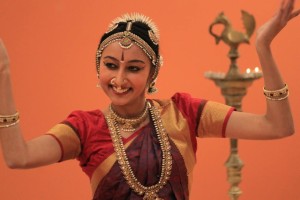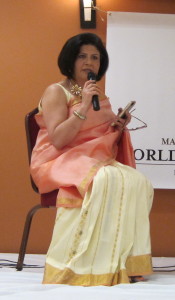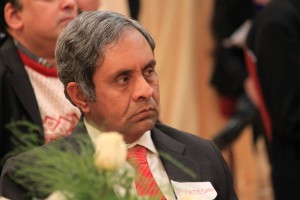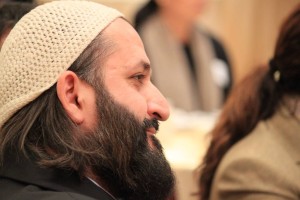![Sri Sri Ravi Shankar, founder and leader of The Art of Living, a Bangalore-based non-profit dedicated to world peace, one person at a time. Source: By Ceeabraham (Own work) [CC BY-SA 3.0 (http://creativecommons.org/licenses/by-sa/3.0)], via Wikimedia Commons](http://www.siliconvalleyoneworld.com/wp-content/uploads/2016/02/ByCeeabraham-14Feb.2013.800px-SriSriRaviShankar-683x1024.jpg)
By Sharon Simonson
MILPITAS—On a recent rainy January evening one of Silicon Valley’s most diverse communities made a very good start toward world peace—or at least some understanding. Inside the India Community Center on Los Coches Street in Milpitas, Hindu, Jew, Muslim, Jain, Zoroastrian, Buddhist and Christian congregated in anticipation of the World Culture Festival in mid-March in New Delhi.
India’s Art of Living Foundation, with five Bay Area centers, and its founder, “spiritual leader, humanitarian and ambassador of peace,” Sri Sri Ravi Shankar, expect 3.5 million world citizens. The purpose, Shankar explains in a video to launch the global event, “is to give the world a message that the whole world is one family, that we can all co-exist. To create a buzz in the world about ‘we care for the rivers; we care for the mountains; we care for the trees and plants.’”
“Good people” don’t just talk about these ideas; they actually do something about them, he says.
Milpitas mistress of ceremonies, Bay Area Indian-American writer and chef Ritu Marwah, kept the evening light, despite the drizzle. “I am quite vain,” she explained upon taking the stage dressed in a peach-colored silk sari offset by carefully bobbed and coiffed black hair. “Please don’t take any pictures while I have my glasses on.”
Art of Living programs supplied the vast majority of her own and her American-born children’s education of their cultural heritage, she confides. She may have grown up in India, but she filled her free time “singing Bollywood songs.”

“I never spent time learning about the spiritual knowledge that is so strong and deep in India, or the cultural and humanitarian values that India and the world share,” she says.
Marwah is hardly the first noteworthy Indian to discover her country’s philosophies outside of her homeland. Gandhi first read the Bhagavad Gita in London, says religious scholar Philip Goldberg in his 2010 book American Veda. Indian spirituality has percolated into the American psyche for more than 200 years, Goldberg says, beginning in Boston with Ralph Waldo Emerson and traveling ever westward, reaching the Bay Area in less than a century. In 1900, India’s Swami Vivekananda started the Vedanta Society in San Francisco. It remains active today, its web site showcasing classes (“Patanjali’s Yoga Sutras”) and appeals for donations to restore its Vallejo Street building, dedicated in 1906. Its YouTube channel is SFVedanta.
When India’s Paramhansa Yogananda published Autobiography of a Yogi in 1946, he dedicated it to Bay Area horticulturist Luther Burbank, whose name falls on many a Silicon Valley landmark. Yogananda is a towering figure in the early 20th century transfer of Indian philosophy to America and especially California. He calls Burbank “an American saint” and writes of visiting Burbank decades before at his Santa Rosa farm.

In the mid-1960s, Milpitas, a town of fewer than 70,000 residents on the southeast flank of the San Francisco Bay, elected the first black U.S. mayor to represent a predominately white city. Today, nearly two-thirds of Milpitans are Asian with roughly equal numbers of Filipinos, Vietnamese, Chinese and Indians. In Spanish, the town’s name means “little cornfields,” and 16 percent of the population is Hispanic (mostly of Mexican descent), a proportion that has remained steady for 15 years.
“I am a personal witness to the many, many activities of this group over many, many years—the arts, culture, music and more important, the message of peace,” Mayor Jose Esteves informs the gathering when he presents a certificate of commendation for The Art of Living to Marwah a few moments later. An immigrant to the United States, Esteves is of Filipino, Spanish and Chinese heritage. He is midway through his sixth, two-year term as mayor. Despite the town’s popular diversity, he says later, “We are able to work harmoniously together.”
Marwah announces the lighting of the lamp, a ceremony intended to invite “the auspicious energies to come in,” one of the event organizers explains. Marwah calls Ambassador Venkatesan Ashok, consul general of India in San Francisco, dressed in coat and tie, to the front of the room. “We are all always leaders,” she says as he approaches. “I have an army at home that follow me around.
“Our consul general speaks Chinese and has authored a book on Vishnu, a god who came down to earth to solve all of the problems created by us.” The man next to me laughs.
The World Culture Festival will be “a giant extravaganza,” the ambassador says. “It’s a major gathering of artists and world leaders, to meditate and celebrate 35 years of service to humanity.” The Art of Living is 35-years-old.

He, too, has observed The Art of Living and Shankar’s reach globally and has been much affected personally by the organization’s “beautiful theme,” the ambassador says. He recalls a Belgrade ceremony to honor Gandhi that Shankar attended. Normally, “a handful of people” come to such events; eight hundred people showed up for Shankar. “Truly it is a world phenomenon,” Ashok says.
With the lamp lighting, a panel discussion begins, featuring Diane Fisher, executive director of the Jewish Federation of Silicon Valley; Abobaker Mojadidi, the Muslim founder of the Bay Area’s League of Education & Afghan Development; and Ashwani Dhall, former chairman of the board for The Art of Living Foundation U.S.A. “I want to stress commonalities,” Marwah instructs the three.
Fisher speaks first. “Jewish people live all over the world. We are in 120 countries. Every place that Jewish people live, we have integrated. Jews in Ethiopia eat Ethiopian bread for Shabbat. Jews in South America are having salsa for their Shabbat,” she says.
“A lot of our commonality comes back to wanting peace and tranquility in ourselves and our society. I think peace is in our nature as humanity,” Mojadidi says.
“No one in this room is going to disagree with you on that,” Marwah says.![]()
“Human values and spirituality have the ability to bring the entire world together as a one-world family,” Dhall says. “It’s no secret that with Shankar’s able leadership, with his profound programs, he has ignited the potential for good in people all across the globe.”

Two volunteers for The Art of Living ascend the stage to describe Shankar’s and the Art of Living’s work to ease intertribal strife in Africa’s Cote d’Ivorie and to end conflict between leftist rebel fighters in Colombia and their federal government; with war veterans, refugees and politicians; with thousands of students in the San Francisco Bay Area to learn breathing techniques and meditation to relieve stress and increase perceptions of well-being.
Congressional candidate Ro Khanna arrives, wearing his signature business suit and open-collared dress shirt. The son of Indian immigrants, Khanna has sought to unseat Congressman Mike Honda for a number of years. The 17th Congressional District includes Milpitas, neighboring Fremont, Newark, Sunnyvale and Cupertino, all cities that have seen their Asian Indian populations skyrocket in the last 15 years.
After deploring “the rhetoric of division” heard in national politics, “the demonization of Hispanics” and proposals to bar Muslims from entering the country, Khanna heralds the Silicon Valley social and business models, which he says welcome “the best and the brightest” from the world over. As a native-born white American , I feel a sudden and unexpected self-consciousness and shame. Thank goodness, I learn later watching “Sri Sri Ravi Shankar’s 10 Rules for Success,” a YouTube video, embarrassment is a cosmic gift. “If you can embrace embarrassment, nothing can shake you,” ![]() Shankar says. I felt fortified.
Shankar says. I felt fortified.